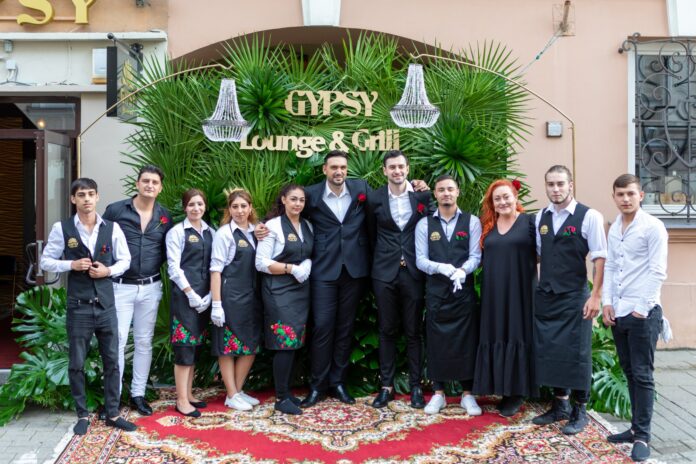
What does it mean to be a Roma in Lithuania? Ištvanas Kvikas, president of the Lithuanian Roma community and leader of the music ensemble Sare roma says: “We were born in Lithuania, Lithuania is our Fatherland and we love our country, we want to belong here and live like everyone else.”
In June, 2020, Ištvanas opened the first Roma restaurant in Vilnius, the only one in Lithuania and perhaps in all of Europe. His mission is to destroy the negative stereotypes about the Roma people. He has hired workers who have the opportunity to learn about culinary arts, customer service, and teamwork.
Chef Veslavas Dudzinskij revealed that his menu includes a traditional Roma hedgehog dish, (which is actually a beef tartare) but Lithuanian and Ukrainian cabbage rolls are made differently: he adds a lot of paprika and other spices that “make the tongue sing”. Roma are a passionate people, who dance and sing – even while cooking. He has another job as well – he sings and plays the organ at the churches in Turgeliai and Juodšiliai.
It is common knowledge that Roma people are not hired for work because they are different. Ištvanas says that the restaurant is a “commercial incubator” for them to begin learning skills that will help them be hired elsewhere.
On April 8 they celebrate International Roma Day. According to 2011 data, there are 2,115 Roma living in Lithuania. Their ancestors arrived in Lithuania in the mid15th century, due to persecution and restrictive laws in other areas of Europe. In Lithuania they were free to move around, and to govern themselves. From 1918 to 1940 the Roma were full citizens of Lithuania. During the Nazi occupation, about 500 of them (one in three) were killed.
Once independence was restored, the first Roma Association in Lithuania was established in 1992. Currently there are eight Roma organizations in Lithuania which focus on social and cultural matters, communication with Roma in other countries, and international projects. Since 2000, various strategies have been put in place for their cultural preservation, employment and women’s rights. Roma genocide is commemorated on August 2, and Romany language day is on November 5.
In Lithuania, the Roma have created their own dialect, which is categorized as a Baltic dialect, based on the Romany language. Roma as a people do not have their own religion, but belong to the predominant faith of the area they inhabit. Litóvska romá (Lietuvos romai, or Lithuanian Roma), the original and most populous Roma ethnic group, as well as the lotfítka romá (Roma who live near the Latvian border) are Catholics. There are also Eastern orthodox and Protestant groups.
This article on bernardinai.lt includes a YouTube video of Ištvanas and Veslavas speaking about their journey – from an apprenticeship to learn French cooking at Stikliai restaurant, to sleeping on the premises for nearly six months to finish renovations and set-up at the Gypsy Lounge. During the short time it was open before the COVID quarantine, it became quite popular, but due to the pandemic is now open for take-out only, with Ištvanas working alone. Enticing photos of both Roma and international foods are worth a look on the video. See bernardinai.lt/būti romu Lietuvoje.
With news from bernardinai.lt





























